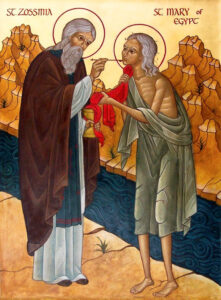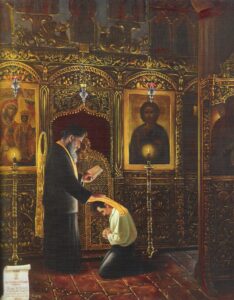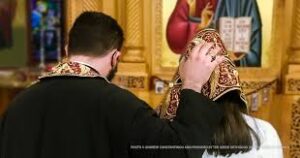
I love this story.

In the late Fourth Century monks from the Monastery of Saint Savas (Mar Sabas) * down below Jerusalem in the West Bank, spent Lent alone in the desert. A priest-monk Zosimas, walking alone one day on the Jordanian side of the river, to his surprise saw someone ahead of him. He called out and a woman answered: Don’t come near. I’m not decently dressed. She was in rags, barely covered. Zosimas left his cloak and drew back. She covered herself, then he came near. She said: You are the first person I have spoken to in 47 years. And she told him her story.
- perhaps the oldest continually functioning monastery in the world.

Her name was Mary. In her teens in Alexandria, Egypt, she had become a prostitute of the most dissolute sort and had been so for seventeen years. She had gone to Jerusalem – on “business”? The empire was now Christian. Jerusalem was drawing many pilgrims, and Mary was swept up in a crowd going into the new Anastasis, the Church of the Resurrection, to venerate the Holy Cross. Did it just happen? or was she seeking? perhaps she didn’t know. Anyway when she reached the door she could not go in – it was like a physical barrier.
And she understood: she was unworthy to enter. Suddenly what she was, her sinfulness swept over her like a wave. She found herself kneeling in the street before an icon of the Theotokos pouring out her shame, promising to repent, change. Then she went back to the church as a new woman and went in.
Soon she left the city. The temptations there were too much. We all know that we can repent of sin very sincerely and yet the temptation comes back. Old habits are not easily broken. So Mary fled across the river into the Jordanian desert and had lived alone all those years and had found God and inner peace.
She wanted to remain alone, so she swore Zosimas to secrecy, but asked him to return next Lent and bring her Holy Communion. He did so. As he drew near the Jordan, she approached the far bank and walked across upon the waters.

She asked him to return the following year. This time she was not waiting. He found her body in a hut with a note: “Abba Zosimas, please bury the remains of humble Mary. I died the day I received Communion. Pray for me.” Before he could begin, a lion came out of the desert and began to dig her grave. She was apparently one of the many saints who have made friends of wild animals.
Zosimas went back to the monastery amazed, but now able to tell her story. Sophronios, Patriarch of Jerusalem, was so moved by it that he had it written down. It spread widely among the faithful. And that is how we have come to hear about her today
Repentance
Saint Mary of Egypt, our Lenten image of repentance. I think the Fathers placed her today, two Sundays till Pascha, for two reasons: 1) To remind us to repent of our sins and clean up our lives before the Great Feast. 2) To remind us that no sin is too terrible to repent of; all sin can be forgiven.
You know that repentance (μετάνοια/metania) means simply to turn around – in our heart, our soul, our mind – turn away from sin, from anything that keeps us away from God and goodness. Repentance means to reverse course, so that we will be moving again towards Him and His will. Repentance means to try to get back on the mark. You know also that sin in New Testament terms means simply “missing the mark” (ἁμαρτία/amartia). It’s an archery term. The bullseye is to “love God with all our heart and soul and mind and strength, and our neighbors as ourselves”. Repentance is a positive thing, turning away from darkness towards the light, from misery and pain towards God and joy. We all know that sin doesn’t make us happy, at least not for long. Sin is poison; it finally destroys us, makes our souls go dead.
That is why the Lord Jesus emphasized the negative aspects of sin – to put it mildly! “If your eye causes you to offend, pluck it out. If your hand causes you to offend cut it off. It is better to enter into life maimed with one eye, one hand, than to go whole to hell where the worm never dies and the fire is never quenched.” Mark 9:48 He’s speaking figuratively, of course *, but He’s trying to shock us. We don’t have forever. Whatever you need to do to stop sinning, do it now while you can. Like Mary of Egypt.
- Origen, a Third Century Christian philosopher of Egypt, was greatly tempted by lust and took this passage literally, and… you don’t want to hear the rest of the story.
God so loves the world, loves you and me so much, that He doesn’t want us to throw our life away on trash and finally wind up with nothing. Because we can’t take our sins into heaven. “Nothing unclean can enter there.” Revelation 21:7 If we plan to hang onto our sins, we’re going to have to take them somewhere else.
I hope you repent often: look at your life and tell God you intend to do better. Certainly before we receive the Eucharist we should look back at the previous week and see where we blew it and ask the Lord to forgive us. Before Pascha we all need to take some time and stop and ask God to show us our sins and repent of them.
The Church’s tool to help us turn around is the sacrament of Confession or Penitence, given to the Apostles by Christ on Pascha night: “Whoever’s sins you forgive are forgiven; whoever’s sins you retain are retained.” John 20:23
The Orthodox Church doesn’t impose the sacrament of Confession on us. There’s no rule about it. It’s no secret that not all Orthodox go to Confession. A century or so ago Confession went out of fashion in some places or in others became just a formality. In recent years it is being used much more as it should: as a time to confess specific sins and receive counsel as to how to overcome them, and the assurance that God forgives.

How should you approach Confession? Open your heart to God and look at your life. Online and in many Orthodox prayer books you can find an “examination of conscience” – questions to help us examine our behavior. It may help to make a list of our failings. This is like listing our physical symptoms before we go to the doctor. You should confess whatever’s troubling you most, but you should also check for other sins. Even if you’re not going to make a formal confession, this is a good thing to do
Most parishes list times for Confessions. In most places, when you come the priest will be standing at the icon of Christ, to the side. You confess facing Christ, with the priest standing beside you facing the same direction, as a witness and as a fellow sinner.
If you’re not going to use the sacrament of Confession, then please examine your conscience and take time to confess directly to God. Do not just drift along “off the mark”.
Why does the Orthodox Church have no private confessional booths, as Roman Catholics do – or did? Because there’s nothing private about sin! Sin hurts the whole Body, just as disease anywhere in your body affects the whole body. James wrote “confess your sins one to another” James 5:16 Apparently in the early Church, the faithful would gather and confess, apologize to each other. This worked well when the Church was small, but soon public confessions got to be more interesting than a TV soap opera, so Confession came to be made only to the Bishop or Priest. But not hidden away. We’re all sinners, that’s no secret, so confessing it, trying to do better is not shameful; it’s wonderful. Why should we hide it away?

The form of Confession varies somewhat among different Orthodox traditions. I won’t go into that here. If you’re new to Confession, don’t worry. Your priest will guide you through it.
I like one line from our Antiochian Orthodox form: “Then the priest says in a kindly voice: My brother (sister) inasmuch as you have come to God and to me, be not ashamed.” Kindly. The priest is not here to beat you over the head and make you feel ashamed. He is here not as a judge, but as a witness and a spiritual doctor, to help you and assure you of God’s forgiveness and let Him heal you.
The penitent confesses specific sins. Don’t blame anyone else. Confess your own sins. Please understand that what the penitent says is “under the seal”. The priest is morally obligated to tell no one what you said. * If he violates that trust the Bishop will likely come and kick him out the front door. Orthodox priests in Communist countries went to prison, even the Gulag, rather than tell the authorities what they heard in Confessions.
- Someone once asked me, apparently seriously, “Do you tell your wife what you hear?” “No! Of course not! I can’t do that!”
The priest will often give advice based partly on the Church’s 2000 years of experience dealing with sins, partly on his experience dealing with confessions, and also on his own experience dealing with his own sins. I like another line from the Antiochian/Greek tradition: “Then the priest says: My spiritual child who have confessed to my humble self, I, humble and a sinner have no power on earth to forgive sins but God alone.” Priests do not have power in themselves to forgive sins; we declare to penitent sinners the forgiveness of God.
Confession has at least five very positive effects:
1 When we confess our sins and say “forgive me”, then someone answers us. Someone with authority from Christ through the Church responds: “You are forgiven”.
2 It helps us deal with guilt, so we will not be pre-occupied with it and can get on to living positively.

3 It provides a regular spiritual checkup, like going to the doctor or dentist regularly. I hope we care about our souls as much as we do our bodies.
4 Sin never seems so stupid as when we confess it. Things that are so tempting: when I say them aloud I think to myself: I found that interesting? Really?
5 Confession gives a specific time of repentance, turning round. Because of the seal of the confessional I can’t tell you about anybody else’s sins, but I can tell you about one of my own. Once when I worked in an office I got involved in what began as conversation about someone, then had turned into malicious gossip, and it was hard to stay out of it. It was doing real harm, and it showed no sign of stopping. So on Saturday I went to Confession.

That provided a stopping point for me. And when I went back to work on Monday, and the gossip started again I found it easy to keep out of it. This works in a practical way: Wash your car, and you’ll think twice before you drive through the mud again.
Those of us who go to Confession find it helpful, consoling, strengthening, sweet. It’s a shame to miss it.
How often should people go to Confession? Some go often, some before the great Feasts, others when they feel the need. There’s no rule.
Now, in case any of you wonder, two footnotes about hearing Confessions:
1 Does the priest think worse of you because you come to Confession? No, the priest already knows you’re a sinner. Everybody knows that! You think it’s a secret? The priest thinks better of you for being brave and coming to Confession.
2 Does the priest get a kick out of hearing peoples’ sins? The answer is: No way. Hearing Confessions is boring. There are only sevent deadly sins. I hear the same things over and over again, with some permutations on the theme. I confess the same things over and over again. If you want to entertain the priest, invite him to dinner. If you want to bore him, come to Confession.
I wish we all could just stop sinning, but we can’t we seem to do that. Therefore your priest is prepared to be bored, if it will help you repent and keep trying to hit the mark and be good.
Beginning next Friday: the first of our annual twice-daily Posts on the Services of Holy Week